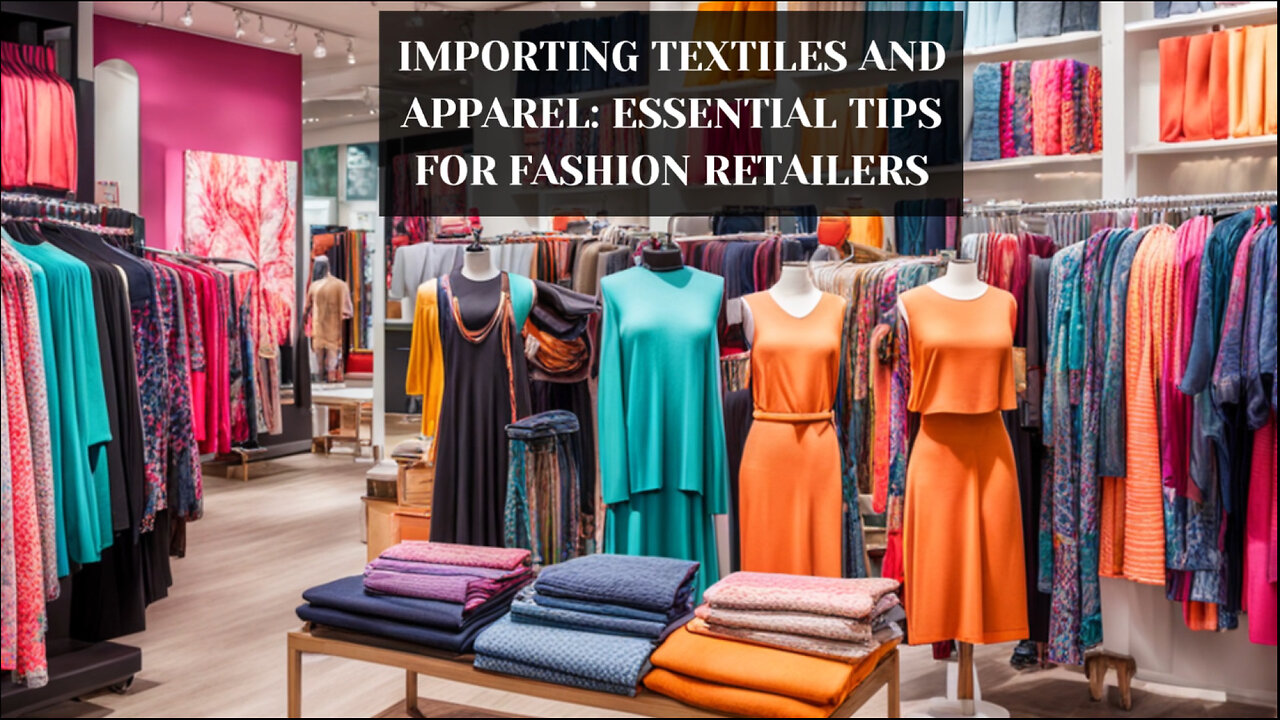Premium Only Content

Navigating Fashion Imports: Tips for Textile and Apparel Importation
ISF Depot // 661-246-8217 // customs@isfdepot.com // www.isfdepot.com
In this episode of our customs brokerage series, we focused on the importation of textiles and apparel for fashion retailers. We started by discussing the importance of customs bonds, which are necessary for importers to guarantee payment of duties, taxes, and fees on imported goods. Moving on, we emphasized the role of customs brokers in assisting importers with customs clearance. These professionals have in-depth knowledge of regulations, documentation requirements, and tariff classifications, making them essential for a streamlined and compliant importation process.
Next, we covered the Importer Security Filing (ISF), an important step in importing textiles and apparel. This filing must be submitted to US Customs and Border Protection at least 24 hours before loading the cargo onto the vessel heading to the United States. The ISF provides crucial information to assess potential security risks.
We then discussed the significance of accurate tariff classification when importing textiles and apparel. Proper classification under the Harmonized System (HS) code is essential for determining the applicable duty rate and avoiding penalties or delays. Working closely with a customs broker ensures accurate classification and minimizes complications.
Additionally, we highlighted the importance of complying with labeling and marking regulations when importing textiles and apparel. Adhering to these requirements is crucial to avoid issues with Customs. By partnering with a customs broker, importers can navigate these regulations effectively.
Furthermore, we addressed the unique challenges that importing textiles and apparel may present, such as dealing with restricted items, navigating trade agreements, and managing quotas. Staying informed about the latest trade policies and partnering with an experienced customs broker are key to overcoming these challenges successfully.
In conclusion, importation of textiles and apparel for fashion retailers requires careful consideration and compliance with customs regulations. Working with customs brokers, properly classifying goods, and staying informed about labeling requirements and challenges in the industry are crucial for a smooth and successful import process. Thank you for watching, and remember to subscribe to our channel for more informative videos on customs brokerage and international trade.
#usimportbond #isfcustomsbroker #uscustomsclearing #isfentry
Video Disclaimer Here: This tutorial is independent and not affiliated with any US governmental entities.
-
 2:23:15
2:23:15
Nerdrotic
7 hours ago $8.26 earnedA Very Merry Christmas | FNT Square Up - Nerdrotic Nooner 453
42.9K4 -
 1:14:05
1:14:05
Tucker Carlson
6 hours ago“I’ll Win With or Without You,” Teamsters Union President Reveals Kamala Harris’s Famous Last Words
122K270 -
 1:58:31
1:58:31
The Dilley Show
6 hours ago $27.24 earnedTrump Conquering Western Hemisphere? w/Author Brenden Dilley 12/23/2024
109K27 -
 1:09:59
1:09:59
Geeks + Gamers
7 hours agoSonic 3 DESTROYS Mufasa And Disney, Naughty Dog Actress SLAMS Gamers Over Intergalactic
70.5K19 -
 51:59
51:59
The Dan Bongino Show
8 hours agoDemocrat Donor Admits The Scary Truth (Ep. 2393) - 12/23/2024
739K2.39K -
 2:32:15
2:32:15
Matt Kohrs
19 hours agoRumble CEO Chris Pavlovski Talks $775M Tether Partnership || The MK Show
112K30 -
 28:23
28:23
Dave Portnoy
19 hours agoDavey Day Trader Presented by Kraken - December 23, 2024
147K40 -
 59:29
59:29
BonginoReport
10 hours agoTrump, Murder Plots, and the Christmas Miracle: Evita + Jack Posobiec (Ep.110) - 12/23/2024
154K128 -
 2:59:14
2:59:14
Wendy Bell Radio
13 hours agoNothing To See Here
125K72 -
 2:12:18
2:12:18
TheDozenPodcast
1 day agoIslam vs Christianity: Bob of Speakers' Corner
111K30